South Sudan excludes Abyei from December elections
- 21 June 2024
- In Abyei, News, Politics, South Sudan
The status of Abyei remains in limbo after the two main parties to the 2005 comprehensive peace agreement could not reach a consensus to implement the provisions pertinent to its status in the deal before South Sudan’s secession in 2011.
The lack of amicable settlement had renewed tensions and skirmishes between members of the Ngok Dinka and rival Arabs with whom they contest territorial ownership.
The stalemate persuaded the Ngok Dinka community and its leadership to conduct a unilateral popular referendum In October 2013. The result favoured a return to Bahr El Ghazal in the south from which it was transferred to Kordofan in Sudan which it was annexed in 1905 during the colonial administration.
The vote required acceptance and adoption of the two countries to determine the final status, but neither Sudan nor South Sudan had accepted the outcome.
In an administrative decision appointing the state high committee on June 19, 2024, the Chairperson of the National Elections Commission (NEC), Abednego Akok appointed chairpersons for high election committees in the 10 states.
The appointments for the three administrative areas, including Abyei were left out. The others are Ruweng and Greater Pibor.
There were no reasons to explain why the decision was made.
A press statement announced the appointments of chairpersons for the states. The appointed chairpersons include: Alphayo Philip Lako for Central Equatoria, Simon Bakama for Western Equatoria, Abdalla Hassan Abididi for Eastern Equatoria, and Joseph Akuei for Northern Bahr el Ghazal states.
Others were Arkangelo Udo for Western Bahr el Ghazal, Jacob Anei for Warrap, Tuor Majok for Jonglei, Kot Kuer for Lakes, Peter Mayom Pur for Upper Nile, and George Kuong Gattang for Unity State.
Akok explained that Abyei Administrative Area will participate in the December polls as part of the Gogrial in Warrap.
He did not elaborate on the context in which the citizens of Abyei would participate in the vote as part of the citizens of Gogrial in Warrap.Gogrial is split into two counties: West and East. Abyei shares direct border with the Twic in the south and Aweil east in Northern Bahr el Ghazal in the southwest of the area.
It therefore remains unclear how the region would participate in the elections and the county in Warrap in which they would participate. Akok expressed doubts about the participation of the entire Abyei area due to “insecurity.”
South Sudan and Sudan are disputing territorial ownership of the oil-producing region of Abyei, which is predominantly inhabited by the nine Ngok chieftaincy and nomadic Arab tribes in Kordofan in Sudan.
The South Sudan Elections law mandates the Chairperson of the National Elections Commission to appoint chairpersons and deputy chairpersons of high committees in the states. Article 97(4) of the Constitution says the high committees shall be responsible to the Commission in administering and supervising the elections and referendum at the state levels.
The chairperson and deputy chairperson of the high committee work full-time. All other members work on a part-time basis, but may be engaged on a full-time basis as the commission deems necessary.
Each high committee comprises five members, including the chairperson and deputy chairperson.
The tenure for high committee members is six years, renewable once.
(ST)

